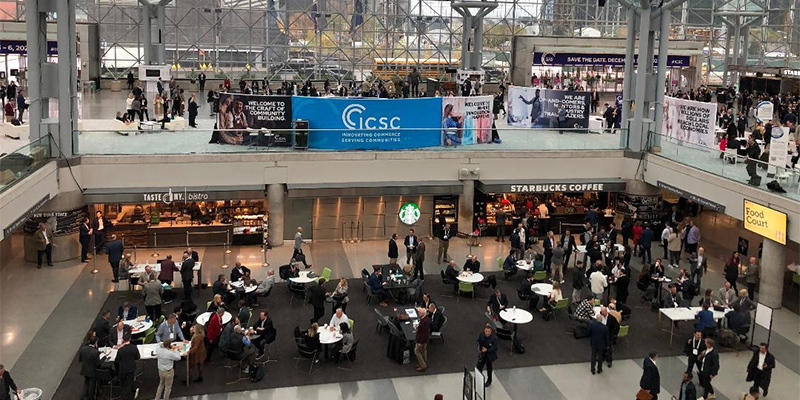Sense of Normalcy Returns to New York ICSC Dealmaking Session
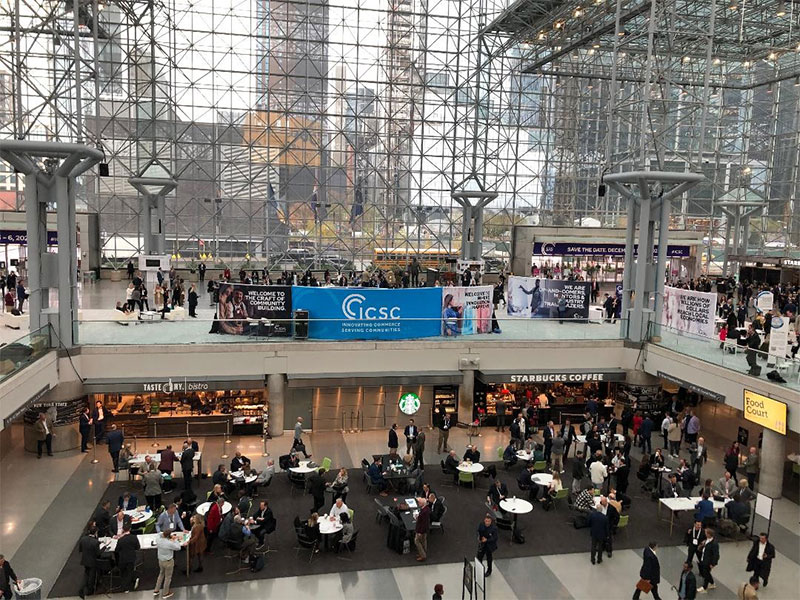
Waiting 1,100 days (1,090 to be exact) for something is a sure-fire way to generate pent-up excitement and enthusiasm. That’s how long it’s been since Innovating Commerce Service Communities (ICSC), the international trade association serving the retail industry, sponsored a dealmaking session in New York City. So, it came as no surprise to witness more than 6,000 brokers, developers, retailers and vendors vigorously shaking hands, hugging colleagues, laughing wholeheartedly and being generally fired up when renewing relationships in person after an intermission of about three years (from December 12, 2019 to last week). It’s been so long that ICSC even had time to rebrand itself from its former namesake, International Council of Shopping Centers.
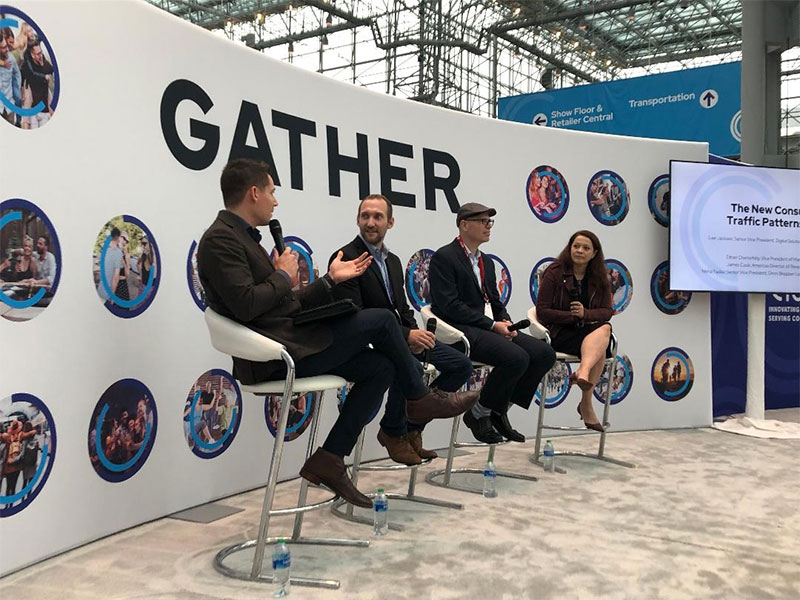
(left to right) Lee Jackson, JLL; Ethan Chernofsky, Placer.ai; James Cook, JLL; Nisha Yadav, Behaviorally
Ethan Chernofsky, Director of Marketing for Placer.ai, may have been the most visible example of the relief and excitement of returning to the New York show. Before answering the first question during a panel presentation focused on consumer traffic patterns and beyond, he went off-script to proclaim to the audience, “Look at all of you here – this is an amazing turnout! I just want to say how great it is to be gathering with everyone again in this forum. It’s been too long but we’re back.” Most show-goers didn’t have the opportunity to make that statement to a wider audience, but the many animated conversations and sustained laughter throughout the Jacob K. Javits Convention Center reflected that same notion.
The pandemic impacted retailers differently, but each learned valuable lessons
Once Chernofsky composed himself, he explained how the pandemic impacted retailers and categories differently, and noted some interesting shopping behavior patterns that formed and then changed as a result of the forced shutdown. “During the pandemic, it was important for consumers to visit as few grocery stores as possible to purchase their necessary items, but now shoppers are more likely to drive around and shop for the best possible price,” he explained. “Many experts were talking about the retail apocalypse in late 2019 and pre-pandemic, but that talk now refers to how stores and shopping centers are more important than ever.
“Now, 1,000 days later, retailers can look back and examine the valuable lessons learned from the pandemic,” Chernofsky said. “Take Best Buy for example. Their stores were only allowed to have a limited number of people inside at one time, so they took advantage of that by establishing appointment-only shopping during different time periods. That prompted consumers who took advantage of this offer to show intent when entering the store. In turn, Best Buy employees could be completed engaged with the consumer to provide the highest-quality experience.”
Lee Jackson, Senior Vice President, Digital Solution Advisory for JLL, described an emerging “unified commerce” concept in which consumers take advantage of all available shopping tools, including websites, social media and brick and mortar stores themselves. In this environment he said it is incumbent for retailers to “meet them there” and make shopping convenient and rewarding. As an example, Jackson described a consumer visiting a shoe store and identifying the style and size they wish to purchase. Using technology, they can determine that the store has in-stock inventory, so all they need is to have a clerk retrieve the shoes from the back room. Next, the consumer could utilize a touchless system to make the purchase and complete a friction-less experience.
Quick-serve restaurant category remains the darling of the industry
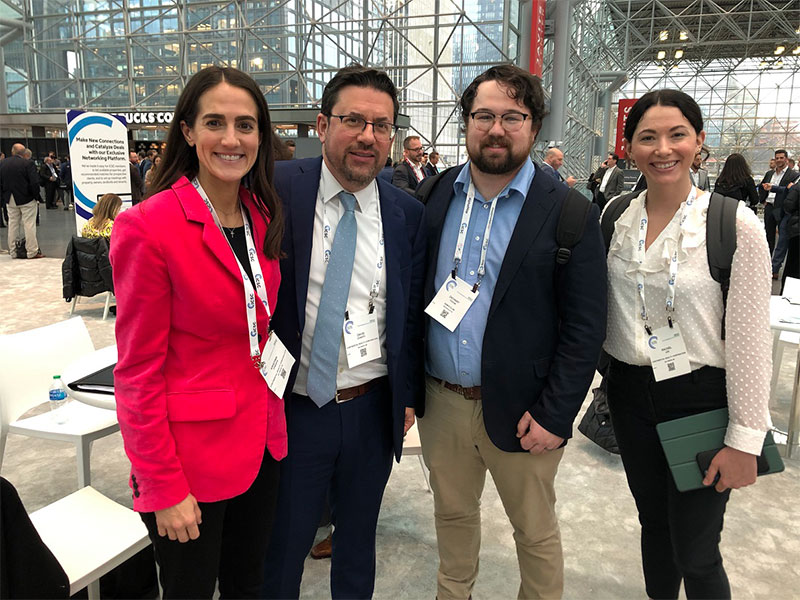
(left to right) Continental Realty Corporation’s Kristina O’Keefe and David Donato; Zachary Yocum, Sam’s Club and Rachel Lee, Continental Realty Corporation
Scanning the activity on the showroom floor from the vantage point of his own experiences, John Schultz, Senior Vice President and Principal of MacKenzie Retail, said there are a lot more tenants looking for quality retail spaces than there are spaces available for lease. This specifically relates to grocery-anchored and multi-tenanted retail centers situated in Class A locations. “The Quick-Serve Restaurant has been the darling of the retail industry for many, many years and that category remains extremely active,” Schultz explained. “Niche fitness concepts that specialize in one particular activity, such as boxing or Pilates, are Internet-resistant and extremely popular among all demographics. In contrast, the medical industry has started to cool off a bit.”
“We closed on the purchase of a five-shopping-center portfolio in the Chicago suburbs in late August of this year,” noted David Donato, COO of Baltimore-based Continental Realty Corporation. “In the very short time we have owned these assets, we have seen overwhelming demand on the pad sites. Full format sit-down restaurants and medical/service tenants are in the mix, but the vast majority of LOIs issued are from QSRs. High population density, huge traffic counts, limited availability, and a busy and growing QSR sector have carried Continental’s roadside NNN leasing to its best performance in years. I honestly cannot think of a QSR brand that is not aggressively expanding.”
More vehicles + less time = dramatic growth of the car wash industry

Kevin Collette, VP Sales, Sonny’s The Car Wash Factory
Talkin’ ‘bout the car wash, yeah.
This annoyingly unforgettable song by Rose Royce rang in my head as I counted four different booths marketing car wash operations or equipment servicing the industry. Why? Because higher numbers of vehicles per household, time-deprived consumers, growing environmental restrictions on water usage and an industry that has embraced higher customer service levels are driving dramatic growth in the car wash industry. In 2021, sales reached $13 billion, according to the International Carwash Association.
Atlanta-based Blue Penguin Car Wash exhibited at the show to connect with land owners and real estate development companies with potential one-to two-acre sites for its concept, which focuses mainly on the Southeast. “The industry has captured the attention of private equity groups, and when that happens, growth and expansion occur rather quickly,” stated Geo Perez, Founder of the Blue Penguin concept. “Consumers are drawn to the convenience of car washes and are not deterred by pricing.”
The single-lane car wash operation connected to a gas station or convenience store is becoming a thing of the past. Now it’s common to see experiential concepts featuring touchless steam cleaning, vending machines, children’s play areas, dog wash options, and oil change and lube services. Consumers gravitate to the purchase of monthly subscriptions providing unlimited usage.
Sonny’s The Car Wash Factory had a steady stream of inquisitive customers at its ICSC booth. The Ft. Lauderdale-based group has been supplying car wash equipment to end-users since 1949, and according to Kevin Collette, Vice President of Sales, vehicle owners are holding onto their cars longer – averaging nearly 12 years – and they want to maintain cars’ values with proper-maintenance, inside and out. “It’s not like the old days when people enjoyed washing cars in their driveways. Time is too valuable and more and more people reside in apartments, which makes car washing difficult. The concept requires minimal labor and is an amenity that any demographic group deems valuable, especially during winter months.” Collette said.
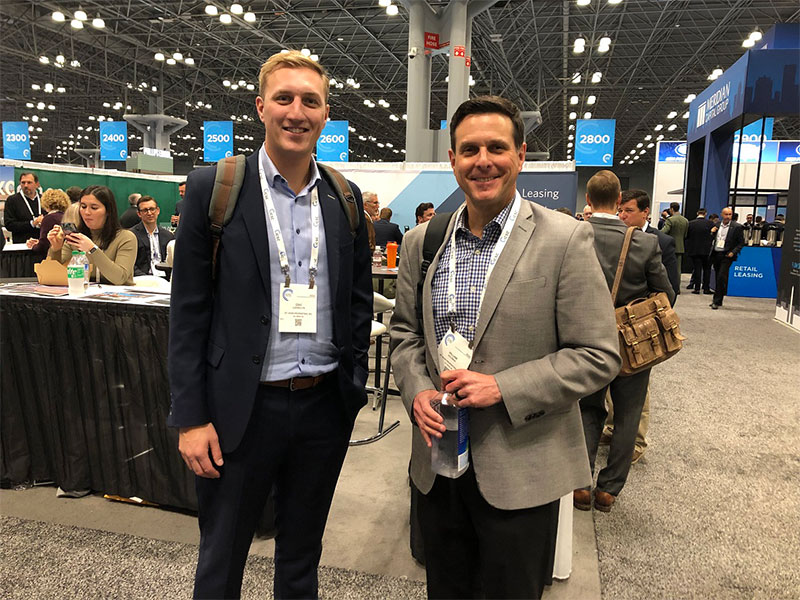
St. John Properties’ Eric Llewellyn and Bill Holzman
Jersey Mike’s trying to keep prices stable despite inflationary period
During his fireplace chat with ICSC CEO Tom McGee, Hoyt Jones, President of Jersey Mike’s Franchise Systems, said that although it is “well-known” that other fast-casual restaurants raised food prices during the recent inflationary period, “Jersey Mike’s tried their best not to.” He believes that “consumers will continue to support concepts that provide high quality products and great service.”
During the pandemic lock-down, digital sales soared and Jersey Mike’s unveiled a timely new app that enabled them to handle the increased volume in Internet-based sales. Including Door Dash sales, that volume has “settled down to the 40% range across all stores,” Jones said.
Just beat it (beat it) to MJ: The Musical
With the conclusion of ICSC it was time to venture out into the unseasonably warm temperatures (upper 50s) to soak in the sights and sounds of the holiday season in a way only New York City can deliver. Tip of the day: don’t miss the performance of MJ: The Musical, because you’ll definitely Enjoy Yourself.


